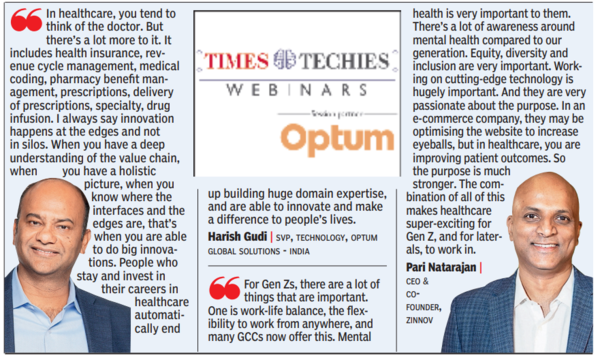The healthcare industry is complex. There are many stakeholders – providers (hospitals, doctors, nurses, etc), payers (insurance companies, government), pharma companies, medical device companies, research institutions. Healthcare is also highly regulated.
This complexity is a big reason why healthcare is expensive. In the US, healthcare costs are 17% of GDP.With its population ageing, that number will rise. So there’s massive pressure to reduce costs. Many are banking on new-age technology to achieve that.
Harish Gudi, SVP of technology at Optum Global Solutions India, the health innovation global capability centre of UnitedHealth Group (UHG), a Fortune 5 company and one of America’s biggest health insurance and services companies, says technologists can deliver a huge impact on the “quadruple aim” of healthcare – access, affordability, experience, and outcome. Access is the ability to receive high quality care when and where you need it. Towards this, Gudi says, companies are building care models that integrate the virtual world, with primary care, specialty care, behavioural care.

Affordability – which also aids accessibility – is being sought to be achieved through providing caregivers with tools that bring information to their fingertips, so that they can coordinate care better, and not have to focus on administration. It is being sought to be achieved through tech platforms that bring price transparency for every drug, checkup, or surgical procedure. And through innovations in medical devices.
Patient and provider experiences, Gudi says, are being substan tially improved through designing more convenient personalised care, intuitive navigation, simplifying payments and administrative work.
And outcomes are being improved through platforms that bring together wellness, preventive screenings, primary care, and medication adherence programmes.
“It’s a very disconnected system now, and we are working to connect everything through digital platforms that allow interoperability of data, and create one seamless view of the ecosystem,” Gudi says.
INDIA TALENT MANDATORY
Pari Natarajan, CEO & co-founder of consulting company Zinnov, says reliance on technology is dramatically increasing in healthcare. And that also means, he says, reliance on India is growing because this is where global companies can get high quality tech talent at scale. Zinnov estimates that over 50 large global healthcare companies have set up tech centres in India over the last several years.
Natarajan says new-age healthtech companies, which are building end-to-end software products, are also coming into India now. “There’s a big trend in the US of private equity firms acquiring healthcare companies and aggregating and creating larger healthcare companies. And part of the playbook for them is to set up GCCs (global capability centres) in India and access high quality talent,” he says.
Natarajan notes that early entrants like GE Healthcare and Philips have innovated products in India at a lower cost, and then made them global products.
The India advantage, he says, is not only that there is a huge talent pool of 1.6 million people just in the GCCs – and another over 3 million in IT services – but also that cities like Hyderabad and Bengaluru have the entire healthcare ecosystem comprising payer, provider, and health device companies. “There is no other location in the world with that ecosystem. That just makes it almost mandatory for companies to access the talent in India,” he says.
Gudi says healthcare is a big opportunity for every kind of tech talent – from cloud engineers and architects to UI/UX designers and data analysts.
This complexity is a big reason why healthcare is expensive. In the US, healthcare costs are 17% of GDP.With its population ageing, that number will rise. So there’s massive pressure to reduce costs. Many are banking on new-age technology to achieve that.
Harish Gudi, SVP of technology at Optum Global Solutions India, the health innovation global capability centre of UnitedHealth Group (UHG), a Fortune 5 company and one of America’s biggest health insurance and services companies, says technologists can deliver a huge impact on the “quadruple aim” of healthcare – access, affordability, experience, and outcome. Access is the ability to receive high quality care when and where you need it. Towards this, Gudi says, companies are building care models that integrate the virtual world, with primary care, specialty care, behavioural care.

Affordability – which also aids accessibility – is being sought to be achieved through providing caregivers with tools that bring information to their fingertips, so that they can coordinate care better, and not have to focus on administration. It is being sought to be achieved through tech platforms that bring price transparency for every drug, checkup, or surgical procedure. And through innovations in medical devices.
Patient and provider experiences, Gudi says, are being substan tially improved through designing more convenient personalised care, intuitive navigation, simplifying payments and administrative work.
And outcomes are being improved through platforms that bring together wellness, preventive screenings, primary care, and medication adherence programmes.
“It’s a very disconnected system now, and we are working to connect everything through digital platforms that allow interoperability of data, and create one seamless view of the ecosystem,” Gudi says.
INDIA TALENT MANDATORY
Pari Natarajan, CEO & co-founder of consulting company Zinnov, says reliance on technology is dramatically increasing in healthcare. And that also means, he says, reliance on India is growing because this is where global companies can get high quality tech talent at scale. Zinnov estimates that over 50 large global healthcare companies have set up tech centres in India over the last several years.
Natarajan says new-age healthtech companies, which are building end-to-end software products, are also coming into India now. “There’s a big trend in the US of private equity firms acquiring healthcare companies and aggregating and creating larger healthcare companies. And part of the playbook for them is to set up GCCs (global capability centres) in India and access high quality talent,” he says.
Natarajan notes that early entrants like GE Healthcare and Philips have innovated products in India at a lower cost, and then made them global products.
The India advantage, he says, is not only that there is a huge talent pool of 1.6 million people just in the GCCs – and another over 3 million in IT services – but also that cities like Hyderabad and Bengaluru have the entire healthcare ecosystem comprising payer, provider, and health device companies. “There is no other location in the world with that ecosystem. That just makes it almost mandatory for companies to access the talent in India,” he says.
Gudi says healthcare is a big opportunity for every kind of tech talent – from cloud engineers and architects to UI/UX designers and data analysts.
Source link

